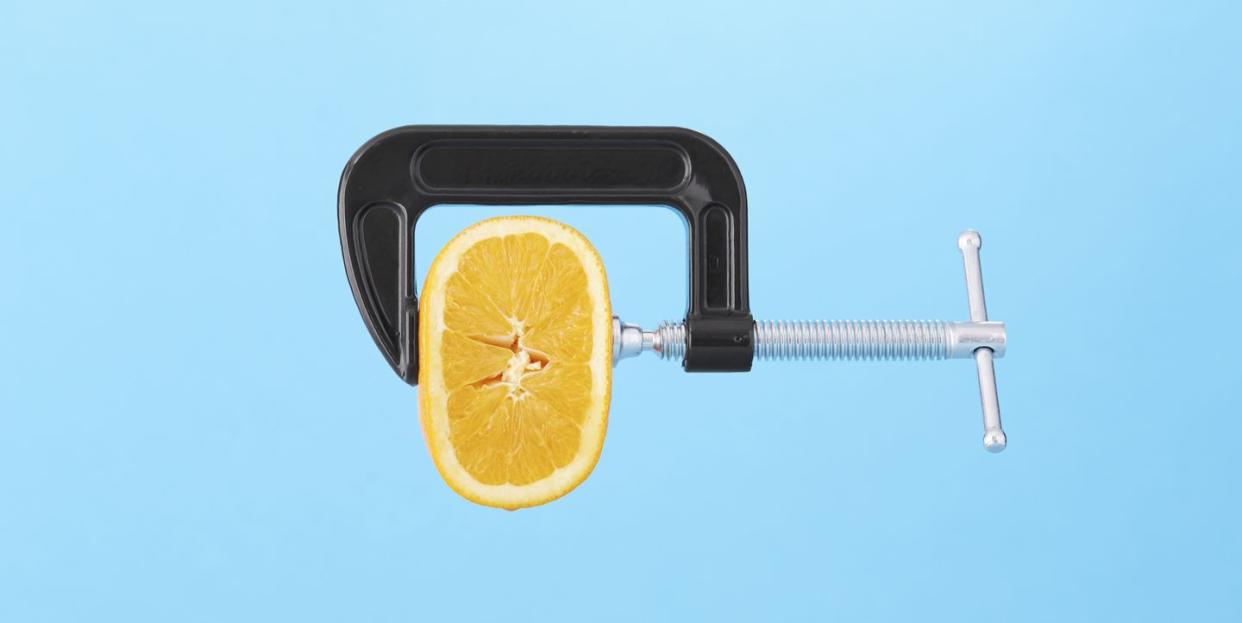Wait, Is It Possible My Vagina Is TOO Tight To Have Sex?

It’s a logical conclusion: If it hurts when a partner tries to put their penis or a toy inside of you, or if they can’t get all the way inside, then it must be a problem of tightness, right? Ehhh, not exactly.
There are several reasons for why you might feel like you’re too tight for vaginal penetration, and it’s actually a pretty common problem that gynecologists hear about. But it’s a misconception that feeling a sensation of tightness means you actually have less elasticity down there-and thinking this may prevent you from finding a real (and, in many cases, easy!) solution.
The truth is, vaginas are ridiculously stretchy, says ob-gyn Susan Khalil, MD, director of sexual health for the Mount Sinai Health System. Think about it: Lots of people push babies out of that tiny hole, so it’s gotta give.
So if it’s not a problem of stretch, what’s the issue? Well, there are a variety of factors that might be at play. For instance, “Certain medical conditions can mimic the feeling of tightness,” Dr. Khalil says.
Here are a few common reasons why it may feel as if your vagina is too tight for sex, plus how to find relief.
You went through a hormonal shift.
During menopause, your body experiences a drop in estrogen, which can lead to dryness and the thinning of vaginal tissues, the Mayo Clinic explains. As a result, you may feel a sensation of tightness or irritation during sex. This is something you should bring up with your doctor, who can recommend an over-the-counter vaginal lubricant, or possibly a prescription estrogen cream or hormone replacement therapy.
For some people, menopause messes with more than just lubrication. Sometimes a postmenopausal vagina also atrophies a little bit, Dr. Khalil says, meaning it literally gets more narrow. “And if they don’t have intercourse at all, it can become very uncomfortable,” she says.
Her recommendation? Masturbation. This way, you’re in total control and can gradually help stretch your vagina and make penetration feel more comfortable for you. If a larger toy is uncomfortable at first, you can practice with a series of vaginal dilators that will help your vagina stretch slowly over time.
Birth control, too, can sometimes cause a bit of hormonal upheaval for some people and cause dryness (and, in turn, painful sex). If you just switched your BC and noticed feeling dry or “tight,” or if you have this issue at a particular time during the month, talk to your doctor about it so they can help you determine whether your birth control might be to blame.
You recently had a baby.
Pregnancy and childbirth also involve hormonal changes that can lead to vaginal dryness and issues with painful sex. This is especially the case if you are breastfeeding, according to the American College of Obstetrics and Gynecologists (ACOG).
Or, if you’re seriously convinced your vagina is tighter after childbirth, it may not be in your head. Though this isn’t super common, Dr. Khalil says that some women who tear during childbirth get stitched up too tightly-meaning that in this one case, their vagina truly is too tight for sex. “Sometimes sutures are done too tightly [and] they’ll need a surgical procedure to fix it,” Dr. Khalil notes.
The same thing can happen if you’ve had a surgery in your genital area (with or without a baby involved), Dr. Khalil notes. But once your doctor goes back in and loosens the stitch, you should be good to go.
Your vagina is too dry.
There’s a laundry list of of reasons for why your vagina may be producing less natural lubrication than it usually does: Maybe you’re going through menopause, you’re breastfeeding, your vagina is naturally dry, or you’re on medication (yup, like birth control) that messes with your lubrication.
Regardless of the reason, though, not having enough lubrication can make sex feel more painful and might make you think your vagina seems tighter, Dr. Khalil says. “I’ll have patients come in and they’ll say it really hurts to have sex,” she says.
Luckily, the immediate solution is pretty easy most of the time: Use a lubricant. Tbh, lubricant makes sex feel better for most people, but it’s especially helpful for people who are dealing with vaginal dryness. Keep in mind, using lube doesn’t actually fix the underlying issue at hand (say, finding a birth control that vibes better with your body), so you should still *always* bring it up with your doc if dryness is a problem for you.
You have vaginismus.
Some people have a condition called vaginismus, which is when the muscles inside their vagina contract involuntarily. The muscle contraction makes it painful anytime something is inserted into the vagina; sometimes even tampon insertion is too much, according to the Merck Manuals.
Most of the time, someone who has vaginismus has it from the very first time they attempt to have penetrative sex. But in other cases it can develop later in life. For some, the cause behind vaginismus may be psychological or a result of an emotional trauma, the Merck Manual says.
While it may take some time to treat vaginismus, working with a pelvic floor physical therapist or gradually using larger and larger vaginal dilators can help, Dr. Khalil says. Working with a mental health professional may also help some individuals.
No matter what, Dr. Khalil encourages talking openly about *any* vaginal discomfort that you’re unsure about.
Whether you feel “tight” or something else, know that you deserve to feel pain-free down below during sex and everything else in life. So be your own health advocate and speak up-to both your partner(s) and your gynecologist.
“Your annual exam is more than a Pap smear,” Dr. Khalil says. “It’s also an opportunity to get to the bottom of any sexual health concerns.”
('You Might Also Like',)

